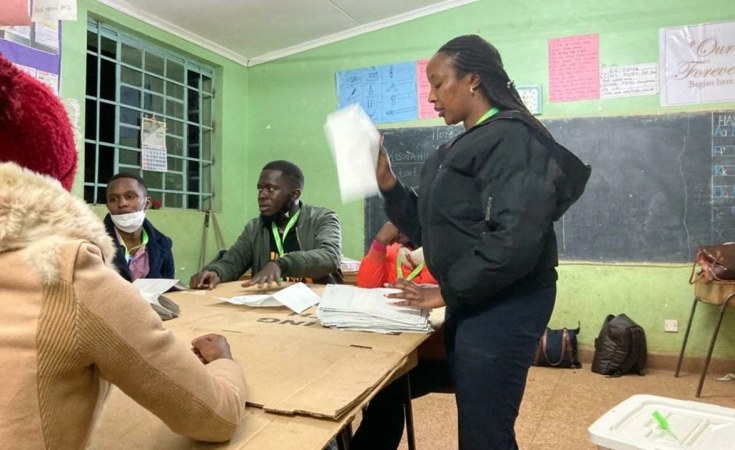The head of Kenya's electoral commission has admitted the tallying of results from the country's presidential election is moving too slowly, blaming political parties for the delay.
Tuesday's election was largely peaceful but disputes over previous presidential votes have been followed by deadly violence, fuelling jitters as provisional results point to a tight race between frontrunners William Ruto and Raila Odinga.
After the Supreme Court annulled the 2017 presidential poll - citing irregularities and mismanagement by the Independent Electoral and Boundaries Commission - the election watchdog is under pressure to deliver a clean vote and release the results by 16 August.
However the complex process of verifying and tallying votes is now in its fourth day, with IEBC chairman Wafula Chebukati accusing political parties of delaying the exercise by haranguing election workers with unnecessary questions.
IEBC DAILY BRIEFINGLive: https://t.co/VK5wPYxSQk#GE2022 #KenyaDecides2022-- IEBC (@IEBCKenya) August 12, 2022
Transparency is paramount
"We have observed that we are not moving as fast as we should. This exercise needs to be concluded as soon as possible," Chebukati said on Friday.
"Please don't interrogate the officers and slow down the process. If we do that we will not be able to finish this exercise," he warned.
The IEBC - in a bid to be transparent - has uploaded forms to its website showing the results from each polling station, enabling Kenyan TV channels to work out their tallies.
But the broadcasters suddenly stopped their tallies on Thursday, with around a million votes left to go, providing no explanation for the halt.
Chebukati has urged Kenyans not to worry about the different projections by various TV channels, saying the IEBC would release the results as soon as possible.
As the wait is likely to stretch into the weekend, some Kenyans say they were increasingly anxious to know who the country's next leader would be.
Low turnout
International observers, including from the United States, the European Union and the African Union, have hailed the IEBC for improving its procedures compared to earlier polls.
But turnout was lower than that seen in previous elections and some Kenyans said they were keen to move on from the vote and resume normal life.
No presidential poll outcome has gone uncontested in Kenya since 2002, and the disputes have led to bloodshed either involving ethnic clashes or police violence.
Social media has been swamped with disinformation about the results, with rights campaigners and civil society groups accusing both candidates' camps of sharing misleading posts.
Kenyans voted in six elections on Tuesday, choosing a new president as well as senators, governors, lawmakers, women representatives and some 1,500 county officials.


